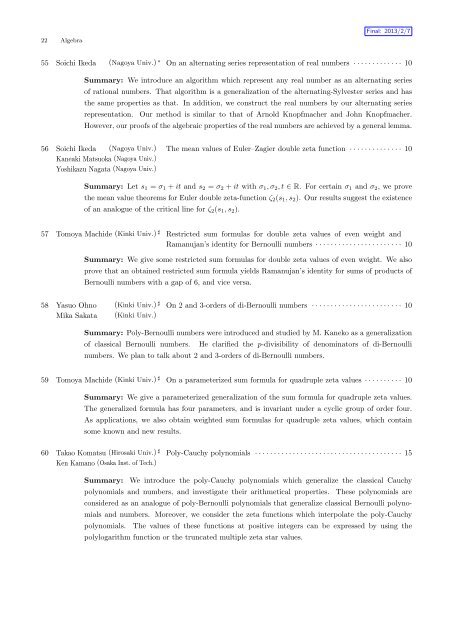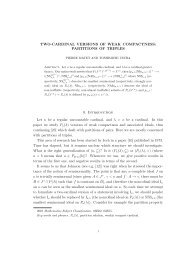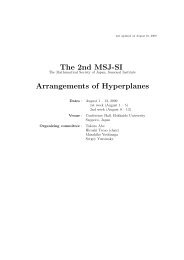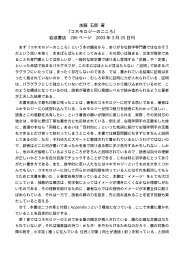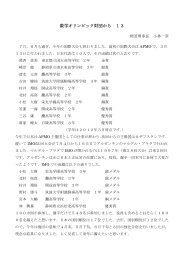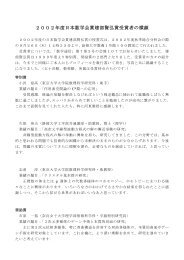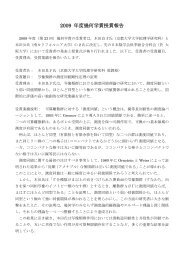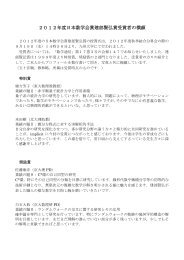Titles and Short Summaries of the Talks
Titles and Short Summaries of the Talks
Titles and Short Summaries of the Talks
You also want an ePaper? Increase the reach of your titles
YUMPU automatically turns print PDFs into web optimized ePapers that Google loves.
22 Algebra<br />
Final: 2013/2/7<br />
55 Soichi Ikeda (Nagoya Univ.) ∗ On an alternating series representation <strong>of</strong> real numbers · · · · · · · · · · · · · 10<br />
Summary: We introduce an algorithm which represent any real number as an alternating series<br />
<strong>of</strong> rational numbers. That algorithm is a generalization <strong>of</strong> <strong>the</strong> alternating-Sylvester series <strong>and</strong> has<br />
<strong>the</strong> same properties as that. In addition, we construct <strong>the</strong> real numbers by our alternating series<br />
representation. Our method is similar to that <strong>of</strong> Arnold Knopfmacher <strong>and</strong> John Knopfmacher.<br />
However, our pro<strong>of</strong>s <strong>of</strong> <strong>the</strong> algebraic properties <strong>of</strong> <strong>the</strong> real numbers are achieved by a general lemma.<br />
56 Soichi Ikeda (Nagoya Univ.)<br />
Kaneaki Matsuoka (Nagoya Univ.)<br />
Yoshikazu Nagata (Nagoya Univ.)<br />
The mean values <strong>of</strong> Euler–Zagier double zeta function · · · · · · · · · · · · · · 10<br />
Summary: Let s1 = σ1 + it <strong>and</strong> s2 = σ2 + it with σ1, σ2, t ∈ R. For certain σ1 <strong>and</strong> σ2, we prove<br />
<strong>the</strong> mean value <strong>the</strong>orems for Euler double zeta-function ζ2(s1, s2). Our results suggest <strong>the</strong> existence<br />
<strong>of</strong> an analogue <strong>of</strong> <strong>the</strong> critical line for ζ2(s1, s2).<br />
57 Tomoya Machide (Kinki Univ.) ♯ Restricted sum formulas for double zeta values <strong>of</strong> even weight <strong>and</strong><br />
Ramanujan’s identity for Bernoulli numbers · · · · · · · · · · · · · · · · · · · · · · · 10<br />
Summary: We give some restricted sum formulas for double zeta values <strong>of</strong> even weight. We also<br />
prove that an obtained restricted sum formula yields Ramanujan’s identity for sums <strong>of</strong> products <strong>of</strong><br />
Bernoulli numbers with a gap <strong>of</strong> 6, <strong>and</strong> vice versa.<br />
58 Yasuo Ohno (Kinki Univ.) ♯ On 2 <strong>and</strong> 3-orders <strong>of</strong> di-Bernoulli numbers · · · · · · · · · · · · · · · · · · · · · · · · 10<br />
Mika Sakata (Kinki Univ.)<br />
Summary: Poly-Bernoulli numbers were introduced <strong>and</strong> studied by M. Kaneko as a generalization<br />
<strong>of</strong> classical Bernoulli numbers. He clarified <strong>the</strong> p-divisibility <strong>of</strong> denominators <strong>of</strong> di-Bernoulli<br />
numbers. We plan to talk about 2 <strong>and</strong> 3-orders <strong>of</strong> di-Bernoulli numbers.<br />
59 Tomoya Machide (Kinki Univ.) ♯ On a parameterized sum formula for quadruple zeta values · · · · · · · · · · 10<br />
Summary: We give a parameterized generalization <strong>of</strong> <strong>the</strong> sum formula for quadruple zeta values.<br />
The generalized formula has four parameters, <strong>and</strong> is invariant under a cyclic group <strong>of</strong> order four.<br />
As applications, we also obtain weighted sum formulas for quadruple zeta values, which contain<br />
some known <strong>and</strong> new results.<br />
60 Takao Komatsu (Hirosaki Univ.) ♯<br />
Ken Kamano (Osaka Inst. <strong>of</strong> Tech.)<br />
Poly-Cauchy polynomials · · · · · · · · · · · · · · · · · · · · · · · · · · · · · · · · · · · · · · · 15<br />
Summary: We introduce <strong>the</strong> poly-Cauchy polynomials which generalize <strong>the</strong> classical Cauchy<br />
polynomials <strong>and</strong> numbers, <strong>and</strong> investigate <strong>the</strong>ir arithmetical properties. These polynomials are<br />
considered as an analogue <strong>of</strong> poly-Bernoulli polynomials that generalize classical Bernoulli polyno-<br />
mials <strong>and</strong> numbers. Moreover, we consider <strong>the</strong> zeta functions which interpolate <strong>the</strong> poly-Cauchy<br />
polynomials. The values <strong>of</strong> <strong>the</strong>se functions at positive integers can be expressed by using <strong>the</strong><br />
polylogarithm function or <strong>the</strong> truncated multiple zeta star values.


